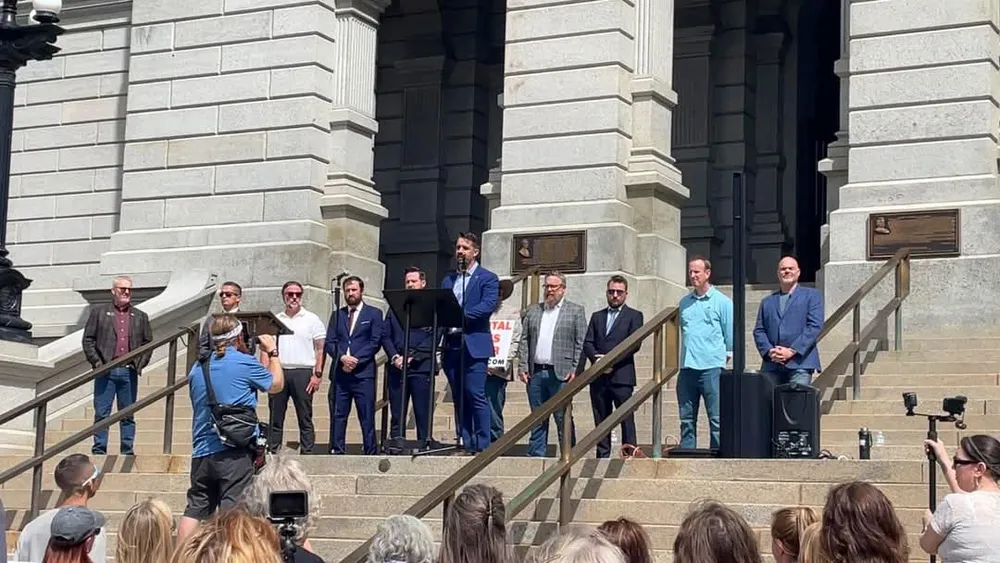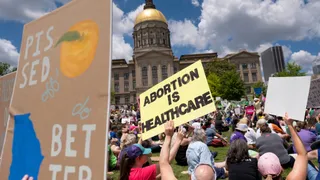"We Don't Do Politics..."

The election was days away. He knew his congregation was divided, some would vote Republican, other Democrat, others third party. And he knew that more than a few would oppose his ballot if they ever discovered how he voted, which he was scrupulous to obscure. For weeks, emails had piled up with various members encouraging him to say something. The administrative assistant kept hounding him to reply. But he couldn’t bring himself to do it.
The elder board of the church was split politically, and the tension exhausted him. He didn’t get into ministry to get political. He just wanted to equip people to love God and love others not navigate landmines every election cycle.
So that Sunday, before opening the Bible, he fell back on the line he’d heard a dozen other pastors use: “Our church is here to focus on the gospel, not get political. I know we’ve got people on all sides of the aisle, but our eyes are on Jesus. We don’t worship the donkey or elephant but the lamb. Let's get into today’s text.” Heads nodded and the room relaxed. And with that, he moved into the sermon for the day, hoping he’d done the right thing. At least he bought himself some time until the next election.
He chose neutrality, not because he didn’t care, but because he feared what would happen if he did. And that fear, that silence, is more common and more consequential than many realize.
This situation plays out in thousands of churches in our country. America is divided. And this division seeps into the church. Pastors are under what feels like enormous pressure to speak out. Whether it’s Black Lives Matter, Donald Trump, or the latest moral flashpoint, pastors feel the weight to speak and equip their congregations on social matters. Some pastors have even experienced church splits after they chose to speak up. But what if “not getting political” is exactly the problem rather than the solution?
When a pastor says, “I don’t get political,” something deeper, and darker, is going on. A deeper issue is being revealed that does not get noticed right away. It sounds virtuous, safe even. It feels nice to say, almost like you are providing people with a one sentence answer to defuse a tense situation and keep people focused on Jesus. But in fact, that sentiment doesn’t resolve the tension, it just buries it. And beneath the surface the rot grows. Refusing to engage politically is not just a theological error or missiological mistake, it is a cultural betrayal, leaving our neighbors to pick up the broken pieces.
For decades, Christians and churches have swallowed the line about “the separation of church and state” as gospel truth. They don’t really question what it means; they just know it sounds American. The impulse to sever the church from politics isn’t just a poison pill for civilization; it betrays a broken view of human nature, and the purpose of bodies and souls.
How so?
For decades, the church has downplayed the body. The body is often viewed with disregard, even disdain. Salvation is often framed as escape from material reality (the body). The ideal, or telos, in this view is a disembodied soul. It is imagined that in eternity we will be disembodied souls. The gospel becomes a message about being free from embodied constraints, unshackled from unchosen bonds.
But Christ’s resurrected body says otherwise. Christians confess that there will be a final resurrection. We believe that in eternity we will be embodied before God. The body matters. Material reality is not opposed to immaterial matters. In fact, they are tied together. For Christians, the church is primarily concerned with immaterial affairs but those immaterial affairs, getting your soul right before the Lord, have material impacts. You literally have to hear with your body the good news of the gospel so that God will save. We are part of Christ’s body, the church, and this body is real flesh and blood people.
Now, how does this relate to politics?
Politics deals with the common life we share in this world. It is mainly focused on how we can have an ordered life together. Man by nature is a political animal, as some have said. We are social and have earthly needs. This is not bad. It is by design. There are biblical warnings about being consumed with a concern for everyday life, but flesh and blood realities are a feature of human life, not a bug.
In short, politics deals with our material reality, or our bodies, and how we relate to other material beings. We should order politics “on earth as it is heaven.” While the church is concerned with heavenly life, the church is not silent on earthly life. Most of Christ’s commands deal with how we order our earthly life according to heaven’s design. And this involves our bodies. In other words, our bodies should be conformed and brought into submission to spiritual realities.
But this is not often taught. Instead, many Christians are taught to believe that being concerned with earthly matters is “worldly” and that “this earth is not our home.” The end result is a church that “doesn’t do politics.” They cut off material concerns from their supposed immaterial focus.
But when you attempt to sever spiritual matters from political matters, it is akin to removing the soul from the body. The body dies. And that is what we are seeing in the West. The body is dying because we’ve attempted to sever the spiritual or theological from politics.
Sadly, many pastors fuel this myth when they say, “We don’t do politics.” But the truth is, they often do, just very selectively. Behind the scenes, they engage in political maneuvering within church networks and parachurch organizations. In public they speak out when the cultural winds blow in a direction they’re comfortable with. This issue is not a rejection of politics, but a carefully curated version of it that is shaped by fear and fashion rather than theological conviction.
There are two things that result from this. First, we are haunted by zombie politics, a corpse roaming without a soul. The spiritual life of the body politic has been removed like a beating heart such that righteousness and virtue cannot be cultivated. Politics roams the earth with vacant eyes looking for something to revivify it.
Second, we become a disembodied church that treats political concerns with contempt. This is at the root of the issue. Because the church refuses to think deeply and slips into people management and chasing cultural trends, it operates like someone with schizophrenia, adopting a split personality. And the more that the pastor and church believes they shouldn’t do politics, the more subverted they become by politics itself.
No wonder so many have lost interest in the church. Who would want to be part of something that seems to take very little interest, or hypocritically selective interest, in the matters you are facing.
These aren’t merely abstract concepts. They play out with real laws and real victims being proposed by Democrats as we speak.
The kind of thinking that says “we don’t do politics” breaks down in the face of a situation like the one we are facing in Colorado with HB25-1312, a proposed law for transgender rights which threatens to criminalize Christians for speaking the truth of male and female and authorize the state to steal children from parents who do not affirm their gender. As some have said, “you may not be interested in politics but politics is interested in you.” The church should be concerned with the material well-being of its neighbors. We are to care for the widows and orphans. But that doesn’t mean we should support laws that make orphans.
As the Western church abdicated its duty to conform earthly matters to heavenly ones, it left a vacuum—one now filled by a warped mirror of that calling: people reshaping their bodies to reflect imagined immaterial identities, i.e., transgenderism. This is entirely predictable. The corpse looking for life will even seek poison ponds to drink from. And as the church has propagated a message that salvation is freedom from unchosen bonds, is it any wonder that it doesn’t have a leg to stand on when people start trying to free themselves from the unchosen bond of their body? When Christians buy the lie that salvation is liberation from the material, it redefines the body itself as the enemy.
The church needs to get involved with politics not for the sake of politics but for the sake of obeying Jesus. This does not mean pastors need to be conversant with the “current thing.” In fact, many pastors and churches might be best served by a pastor “staying in his lane” so to speak. But the sheep need to be fed and pastors should develop a basic, biblical and theological diet that equips Christians to think and live politically. Surely there is better food available than “we don’t do politics.”
Related Articles
Ben Zeisloft | 5/2/2025
Emotional Sabotage and the Abolition of Abortion
Christians face emotional sabotage from both pro-abortion zealots and pro-life groups when advocating for preborn equal protection.
Vanessa Hunt | 4/30/2025
Gen X: The Best Generation or the One That Missed It?
From latchkey kids to helicopter parents, Gen X shaped a generation—now it’s time to own our mistakes and lead.
Keith Foskey | 4/25/2025
Addicted to Entertainment: Glorifying God In An Age of Endless Amusement
From doomscrolling to alcohol, Christians must navigate modern amusements with biblical wisdom.
Steven Whitlow | 4/11/2025
"The most political church in town..."
Is a pastor’s insistence on avoiding politics really about principle, or is it just cowardice in disguise?
Michael Clary | 4/8/2025
God Has Given Us An Inch. Let's Take A Mile.
God has given the American church a fleeting reprieve. How can we seize it?
Josh Howard | 3/28/2025
'How Should We Then Shift?': A Christian Response to Cultural Changes
Vibe shifts may be shallow, but they hint at deeper currents Christians can’t ignore.





